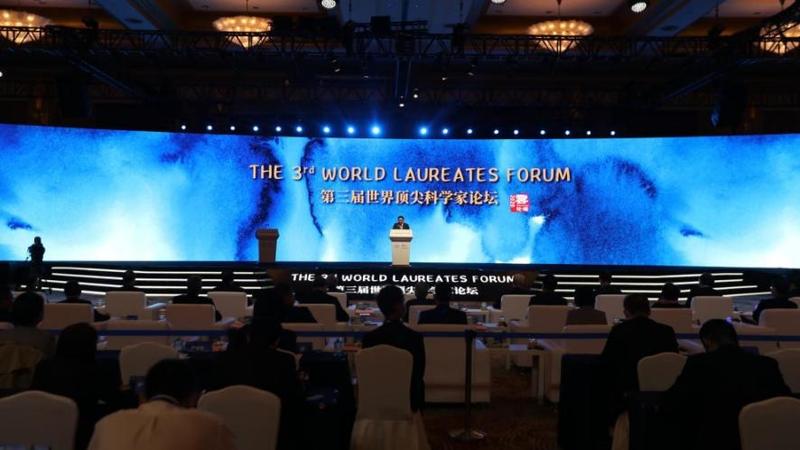 The third World Laureates Forum kicks off in Shanghai on Oct 30, 2020. (PHOTO/CCTV.COM VIA CHINADAILY.COM.CN)
The third World Laureates Forum kicks off in Shanghai on Oct 30, 2020. (PHOTO/CCTV.COM VIA CHINADAILY.COM.CN)
The COVID-19 pandemic has accelerated digitalization of production processes but will not reverse economic globalization, experts said at the third World Laureates Forum in Shanghai.
With more work done at home or remotely, the future job market will give more weight to expertise in digital technologies and probably require workers to engage in lifelong learning of new digital techniques, said Christopher Pissarides, a professor at the London School of Economics
The three-day forum, which concluded on Sunday, gathered nearly 140 world scientific award winners, including 61 Nobel Prize laureates and more than 30 Chinese academicians, to discuss-in person and virtually - a wide range of scientific frontiers, including quantum physics, brain science and biomedicine.
Scientists praised the successful event, saying it helped maintain a smooth channel for international scientific communications during the pandemic.
"China is probably the only country able to host such an event," said Roger Kornberg, a biochemist from the United States who won the Nobel Prize in chemistry in 2006 and addressed the forum via video link. "The challenges of bringing together 137 laureates of various prizes as well as a very large number of other participants and young people is a logistical nightmare and really almost impossible to accomplish. And yet, the leaders of this effort in China have succeeded and done a brilliant job."
ALSO READ: Quantum physics hot topic at forum
Facing the grim global economic climate, the event included a sub-forum that brought four winners of the Nobel Memorial Prize in Economic Sciences together via an online conference to address the issue of economic challenges.
Christopher Pissarides, a professor at the London School of Economics who won the economics prize in 2010, said the long-term implications of COVID-19 will reshape work arrangements and global economic structures.
It has already accelerated automation and digitalization, reducing reliance on human labor and halting job creation in services, especially those involving person-to-person interactions, he said, and will lead to more job losses in the near future.
With more work done at home or remotely, the future job market will give more weight to expertise in digital technologies and probably require workers to engage in lifelong learning of new digital techniques. New elements, such as the ability to trade online and provide healthy environments, will also become important, Pissarides said.
As the acceleration of automation will never be reversed, and job creation in services may come back only very slowly after the end of the pandemic, he said employers will need to consider retraining employees with skills that are more adaptable to the post-COVID job market.
READ MORE: Global heft for Pudong science hub
Another big issue related to increasing automation is the widening of the gap between the rich and the poor, said Norwegian economist Finn Kydland, who won the 2004 economics prize. The economic downturn has not affected all sectors, and the pandemic has hit people with low wages and low skills much harder than those earning high incomes, he said.
Faced with such a disparity, Kydland said many European countries have simply given direct subsidies to the most affected industries to try to maintain employment, but such measures are very expensive and not sustainable.
Governments should also make sure capital is available and well-distributed to families and small and medium-sized businesses to support their return to normal activity because they will play a key role in future employment, said US economist Lars Peter Hansen, who won the economics prize in 2013.
Hansen said the response to the second wave of the pandemic is all about the trade-off between treating the disease and maintaining economic activities.
ALSO READ: Xi stresses innovation as primary driving force for development
When a government opts for a lockdown, the economic structure and development will inevitably be affected, irrespective of the government's experience in dealing with the first outbreak, he said, adding that the world economy is still at a "very difficult stage", with a successful vaccine far down the road.


